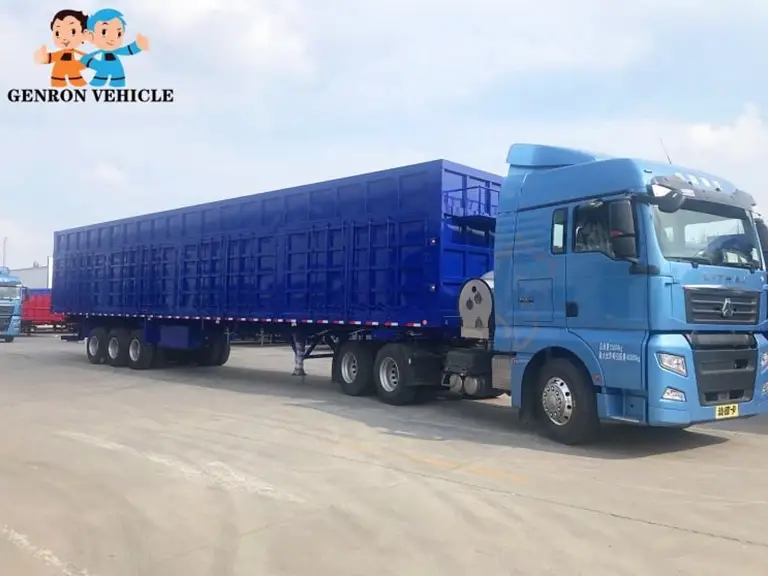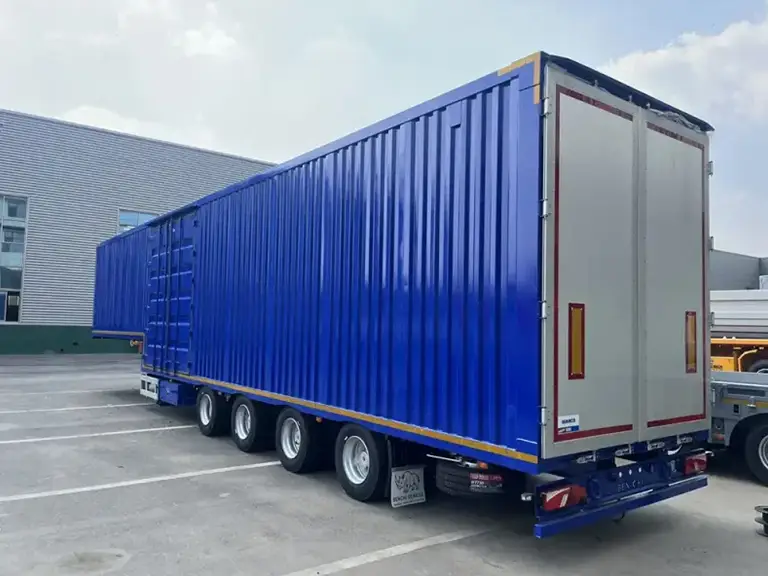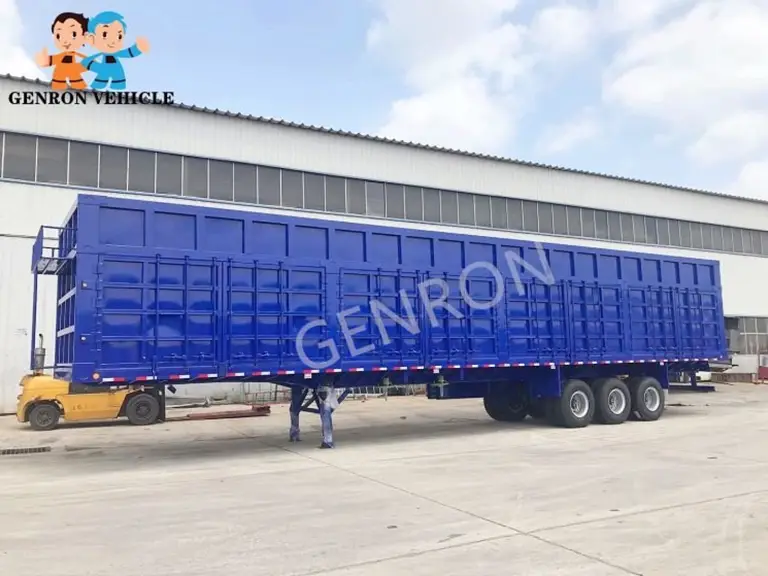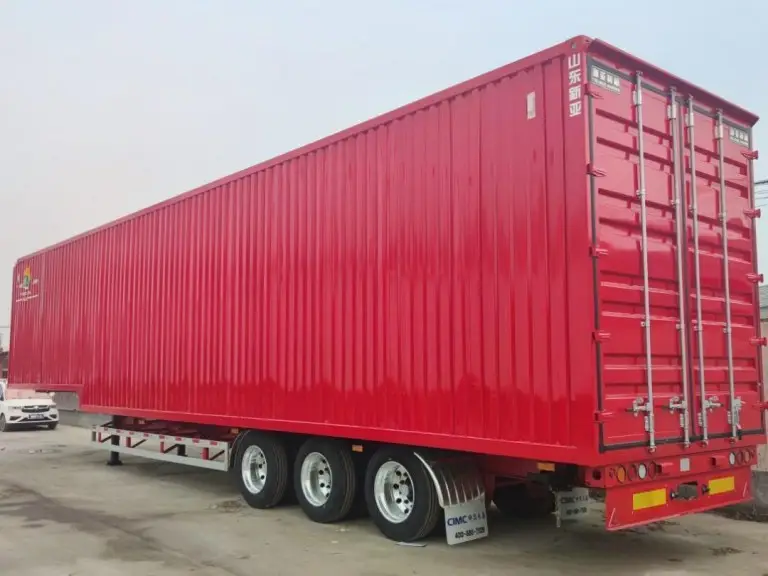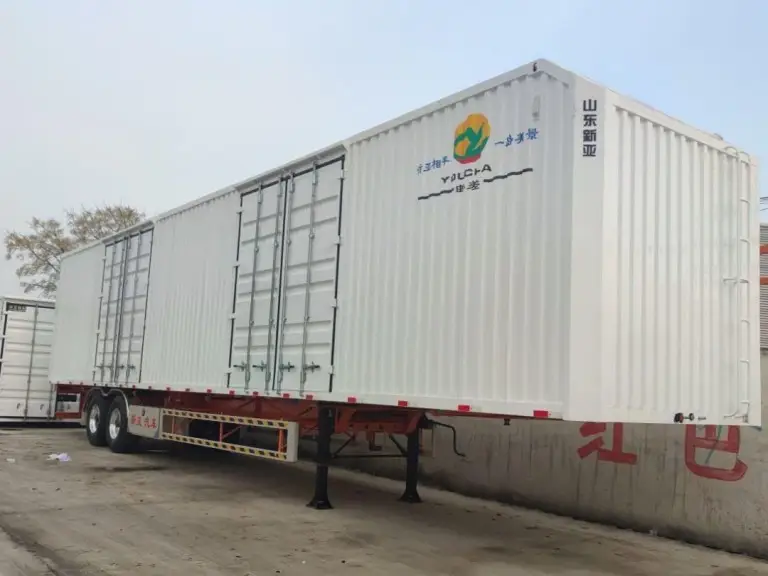A semi box trailer, also known as a dry van trailer. It is approximately 53 feet long, 8.5 feet wide, and roughly 13.5 feet tall. These dimensions are popular and are intended to fulfill highway rules while accommodating typical freight loads.
This guide delves into semi box trailer dimensions and their role in freight capacity, road safety, and efficiency. Knowing these specs helps fleet managers and logistics pros optimize operations and cut costs.
Table of Contents
Understanding Semi Box Trailer Basics
A semi box trailer is a fully enclosed unit designed to shield cargo from the elements. It’s versatile for transporting a wide array of goods. Grasping their basics is crucial for efficient logistics management.
Standard Semi Box Trailer Dimensions
Standard semi box trailer dimensions aim to balance cargo capacity with regulatory needs. These dimensions are vital for efficient transport and compliance with industry standards.
Length Specifications
The length of semi box trailers is crucial for freight capacity. They range from 48 to 53 feet, with some states allowing up to 59 feet for specific uses.
Knowing length specs is essential for fleet operators navigating urban areas or spaces with limited room. Length impacts the turning radius and vehicle footprint.
Width Measurements and Standards
Most semi box trailers are 8.5 feet wide (102 inches). This standard ensures compatibility with highway widths, facilitating smooth transport across states.
Sticking to the standard width is crucial for regulatory compliance and safe highway navigation.
Begin with a bespoke semi-trailer designed for your exact needs. Whether it’s heavy-duty hauling or specialized cargo, we’ve got the perfect solution to keep you moving forward.
Height Considerations
Standard semi box trailers have a maximum height of 13.5 feet for bridge clearances. However, the cargo height inside is about 110 inches. Height is key for safe cargo transport and compliance with infrastructure limits.
Weight Capacity and Load Limits
Standard semi box trailers can carry about 45,000 pounds of freight. However, this can vary based on the trailer’s build and axle setup.
Understanding weight capacity and load limits is vital for safe transport and regulatory compliance. We stress the importance of adhering to these limits to avoid hazards.
Further Reading:Box Semi Trailer Capacity
Types of Semi Box Trailers and Their Dimensions
Knowing the different semi box trailer types is key to choosing the right dimensions for your cargo. We offer various trailers, including dry vans and refrigerated units. Each is tailored for specific logistical needs.
Dry Van Trailers
Dry van semi trailers are the most common, with fully enclosed cargo spaces. They measure 53′ in length, 102″ in width, and 110″ in door height. This makes them perfect for protecting general freight from weather and theft.
Refrigerated (Reefer) Trailers
Refrigerated trailers have similar dimensions to dry vans but include insulated walls and cooling units. This reduces internal space by about 2-3 inches on all sides, ensuring temperature control for perishable goods.
Flatbed and Lowbed Trailers
Flatbed trailers and lowbed trailers have open cargo areas without sides or roofs. Flatbeds keep a standard width of 102″ but vary in deck height. Lowbeds, on the other hand, have significantly reduced deck heights (18″-24″) to handle taller cargo.
Specialized Box Trailers
Specialized box trailers are designed for specific cargo types, like automobile carriers and livestock trailers. Each model has unique dimensions tailored to its purpose.
Intermodal Container Trailers
Intermodal container trailers are made for transporting standardized shipping containers, usually in 20′, 40′, or 53′ lengths. They allow for easy transfer between ships, trains, and trucks without unloading the cargo.
Genron International Trade offers customization to meet specific transportation needs. Our main products include tanker trailers, lowbed trailers, flatbed trailers, and end dump trailers, among others. Understanding each trailer’s dimensions and capabilities helps businesses make informed decisions about their logistics.
Conclusion
Choosing the right box semi trailer dimensions is key to efficient logistics. At Genron International Trade, we offer customized semi-trailers tailored to specific needs. Our team provides expert advice to help clients pick the perfect trailer dimensions for their freight. This ensures compliance with regulations and maximizes cargo capacity.
Partnering with us means getting access to high-quality, customized trailers designed to improve your transportation operations. We’re dedicated to delivering exceptional service and support to meet our clients’ evolving needs.
FAQ
What are the standard length specifications for dry van trailers?
Dry van trailers usually range from 28 to 53 feet in length. The 53-foot length is the most common for domestic freight transport.
How do width measurements vary for refrigerated trailers?
Refrigerated trailers typically have a standard width of 102 inches. This width follows federal regulations for highway transport.
What are the height considerations for intermodal container trailers?
Intermodal container trailers can reach heights up to 110 inches. However, it’s crucial to check specific equipment and route restrictions.
Can flatbed trailers accommodate oversized loads?
Flatbed trailers are designed for oversized or heavy cargo. They offer flexibility for loads that exceed standard van trailer capacities.
What are the benefits of using specialized box trailers for unique cargo needs?
Specialized box trailers provide customized solutions for specific cargo requirements. They enhance transport efficiency and safety for oversized or sensitive goods.
What factors should be considered when selecting a trailer for international shipping?
When shipping internationally, consider factors like container size, weight limits, and regional regulations. This ensures compliance and smooth transport.

